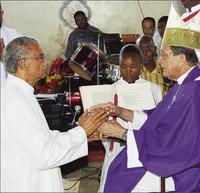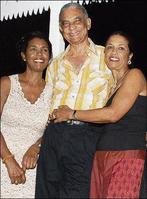Mark Dawes, Staff Reporter 
The Most Reverend Charles Dufour, bishop of Montego Bay (right), goes through the installation rites with former Government Minister Francis Tulloch, now an acolyte, at the Sacred Heart Catholic Church in Seaford Town, Westmoreland. - Dalton Laing Photo
When Francis Tulloch was installed as an acolyte on Sunday, February 24, at Sacred Heart Catholic Church, Seaford Town, Westmoreland, it came as a surprise to many. But to those who have known him, it was hardly surprising as he has in recent years been stepping out more boldly on his journey of faith. Tulloch is on the road to becoming a deacon in the Roman Catholic Church.
"It is not that I am finding religion. It was always there," he said.
Becoming an acolyte is one stage of the journey towards the diaconate. He embarked on studies towards ordination as a deacon two years ago. He hopes to complete his studies within the next two years.
The former minister of tourism in the P.J. Patterson Cabinet has, all his life, been a Roman Catholic. He was born into a family where his parents were active Catholics and he and his brothers were in their early years altar boys.
He grew up in Kingston and worshipped at St Theresa's Church in Vineyard Town, St Andrew, and attended St George's College. While a student of St George's College his classmates included persons who have gone on to distinguish themselves in national life, including Fr Richard Ho Lung, who later abandoned the halls of academia to become founder and director of Missionaries of the Poor, an indigenous order of the Roman Catholic Church which seeks to minister to some of the poorest and most destitute in the country.
Tulloch was strongly influenced by the priests at St George's College, so much so that he considered that vocation. "When I was about 17, I went to my mother and actually said to her that I was thinking about the priesthood. She said she would not mind, but that I was to learn a little more about the world first. And she was right," Mr Tulloch told The Gleaner during an interview in Lethe, St James, where he has his business and residence.
He went off to study law in England and there he flirted with agnosticism for about a year. But it did not last as the orthodoxy he learnt as a youth had taken deep roots and he soon started attending Mass again.
"Needless to say, when you leave school and you are not prepared for the world outside - you run to some of your peers at university. Your faith is certainly shaken. I tried a little agnosticism when I was studying for the Bar, but it did not work out. I get the feeling that once you really had faith, you can't just get rid of it like that. I tried agnosticism for about a year. That was perhaps one of the unhappiest times of my life. So I dropped that and started going back to church. My life came back," Tulloch said.
"I think most of us in our 20s, 30s and 40s sort of stray a little bit. But I never stopped going to church other than that little period (when he embraced agnosticism) in England," said the 67-year-old former member of parliament for North West St James.
Barrister

Former parliamentarian Francis Tulloch is flanked by two beauties - wife Doreen (left) and her sister Olive Shelton - in this May 2007 photograph. - File
On his return to Jamaica, he practised as a barrister. Soon, however, he grew uncomfortable with his practice of criminal law as it posed for him serious conflicts with his conscience. "The fact is that I loved criminal law. But there was a conflict between what my conscience told me was right and what I had to do as a criminal lawyer. Of course, you are not going to tell anybody to go into the witness box and lie. There was a serious conflict - that was when I decided to leave Jamaica. I believe I could have been a very good lawyer, but there was definitely conflict there," Mr Tulloch said.
These conscience issues influenced his decision to go and practise the law in The Bahamas for the period 1964-1969. There, he had as his law partner Lynden Pindling who later became Prime Minister of The Bahamas.
He later returned to Jamaica and resumed his law practice, this time doing less criminal law and engaging himself in political work on the behalf of the People's National Party (PNP).
As Tulloch grew older, he became unhappy with the declining membership within the Roman Catholic Church. He soon made up his mind to become more involved in the life of the church as one way to curb the decline. So when some time later, the Most Rev Charles Dufour, Roman Catholic bishop of Montego Bay, asked him to consider becoming a deacon that idea resonated with him as another chance to serve people.
"I see myself trying to build the church and God's kingdom in very similar ways to what I tried to do as a politician, you know, help the poor, try your best to feed the hungry and give shelter to the homeless.
Instead of getting votes, I prefer to win couple souls, going house to house and win some souls instead of getting votes," he said.
As an acolyte, Tulloch can hold communion services, serve communion and preach. He has two years to go before he can be ordained a deacon. He has not yet been assigned a church, nor has he delivered his first sermon as yet. But he is confident that before too long, he will be assigned a church and that his preaching ministry will soon begin.
He hopes to get a rural posting. He loves rural people and looks forward to walking house to house to share faith instead of seeking votes.
He believes a strong diaconate is crucial to the future of Roman Catholic witness in Jamaica especially since not many of its men seem willing to take vows of chastity and celibacy.
Cloud of suspicion
The former government minister acknowledged that it is difficult to maintain one's Christian witness while functioning as a politician. But not it is not impossible, he said. "The truth is we are under such a cloud of suspicion just by being a politician that I suppose, even at a church level, there are people who will say, "Him a politician, him a look something." You really have to go into those areas where you feel that people trust you. As a politician, you start out with a certain amount of doubt in everything that you do. The poor who know you might be more prepared to give you a listening ear. But I don't think it is to your credit being a politician and going into the ministry," Tulloch said. He nevertheless acknowledged that to date he has not encountered any adverse comments or situations surrounding his stepping into ordained church leadership.
No goody-two shoes
Asked how his faith affected his work as a minister, he said, "I am no goody-two shoes, nor am I any angel. But there is a level below which you do not go. Sometimes, you are called on to turn a blind eye and it is very difficult. And you can't come out and talk about it just so. And so when you try to do something about it internally, you don't reach very far in politics. You appear to be not one of the boys, not part of the team. But just like how I have questions to ask my own Catholic Church, I am not going to leave it because I have questions. I don't see myself serving the PNP although I am a PNP. I see myself serving the country first. But I would not leave the PNP to join another party. If I see something is wrong, and I don't say I know everything that is right, I must try and change it."
Tulloch says he is enjoying every minute studying for the diaconate. He has gained a fresh and deeper appreciation of the Eucharist and its centrality to the Roman Catholicism. The more he studies for the diaconate, the more he wants to become a deacon, he told The Gleaner.
Yet, he acknowledged that his faith is not where is should be. "I am still way behind in my walk (with the Lord). I still have a tremendous way to go. I don't believe I love God and Jesus yet in the way that I should, but I fear and reverence them both. I am very God-fearing. I would not swear to you that I love Him more than I love my children and my family. It is supposed to be Him first. I don't think I have reached there yet. I am working hard towards it.
"The Roman Catholic Church," he said, "is very secure in its faith. It is quite clear to me in the study of the catechism that there is truth outside of the Roman Catholic religion and that there is salvation through other religions."
Problems
He does, however, have problems with the idea of hell. He recounted how as a youngster he asked the Jamaican theologian and internationally renowned Roman Catholic intellectual the late Msgr Gladstone Wilson, "How can a God of love send anyone to hell." Msgr Wilson's response, Tulloch said was: "That is something I have been asking myself for several years."
Tulloch, for his part, said the matter of hell's existence and how a loving God could allow someone to go there is still an unresolved matter in his own mind. But when it comes to hell, he said, "I am not taking any chances."
Send feedback to mark.dawes@gleanerjm.com.

